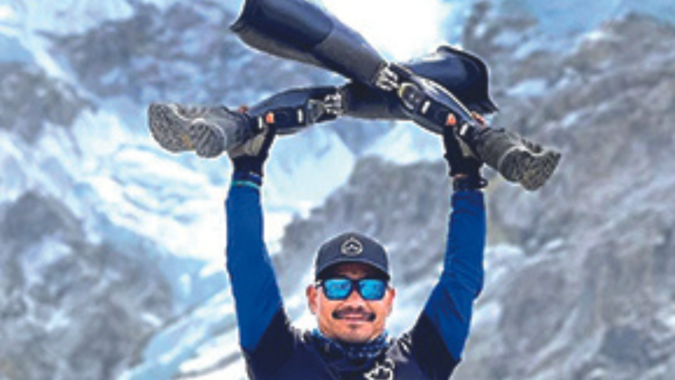KATHMANDU: Gorkha veteran Hari Budha Magar, who was almost killed serving with the British army in Afghanistan, has become the first double above-the-knee amputee to climb Everest, a member of his team said Sunday.
“He reached the top of Sagarmatha at around 3pm (local time) on Friday. After summiting the peak, he has descended to the base camp,” Him Bista said.
Magar, 43, lost his legs after stepping on an improvised explosive device in 2010 while on patrol in Afghanistan with the Gorkhas, a unit of Nepalis who have fought with the British army for over 200 years.
Two below-the-knee amputees have reached the peak in the past – New Zealander Mark Inglis in 2006 and China’s Xia Boyu in 2018.
Magar was fitted with prosthetic legs and aside from kayaking around the Isle of Wight climbed several peaks including Morocco’s Mount Toubkal and Mont Blanc in Europe. But the former corporal was prevented for several years from climbing the world’s highest mountain by a Nepalese law banning double amputees, and also blind people, from mountaineering.
Nepal’s top court quashed the law – which was not in place when Inglis climbed the peak – in 2018 under pressure from Magar and others. “As long as you can adapt your life according to the time and the situation, we can do anything we want. There is no limit, the sky is the limit,” Magar said last month before heading to the Everest base camp. “I hope my climb will help change the perception of persons with disabilities,” Magar said from the base camp.
“He reached the top of Sagarmatha at around 3pm (local time) on Friday. After summiting the peak, he has descended to the base camp,” Him Bista said.
Magar, 43, lost his legs after stepping on an improvised explosive device in 2010 while on patrol in Afghanistan with the Gorkhas, a unit of Nepalis who have fought with the British army for over 200 years.
Two below-the-knee amputees have reached the peak in the past – New Zealander Mark Inglis in 2006 and China’s Xia Boyu in 2018.
Magar was fitted with prosthetic legs and aside from kayaking around the Isle of Wight climbed several peaks including Morocco’s Mount Toubkal and Mont Blanc in Europe. But the former corporal was prevented for several years from climbing the world’s highest mountain by a Nepalese law banning double amputees, and also blind people, from mountaineering.
Nepal’s top court quashed the law – which was not in place when Inglis climbed the peak – in 2018 under pressure from Magar and others. “As long as you can adapt your life according to the time and the situation, we can do anything we want. There is no limit, the sky is the limit,” Magar said last month before heading to the Everest base camp. “I hope my climb will help change the perception of persons with disabilities,” Magar said from the base camp.
